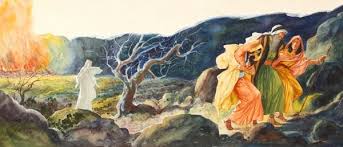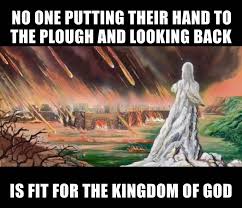Don't look back, was the theme of many cautionary warnings that Jesus gave us. It is therefore crucial that we gain insight into the significance of what he meant. As we will see, it is especially suited for the time of the End, in which we live.
Luke chapter 17 reads; "28 ‘It was the same in the days of Lot. People were eating and drinking, buying and selling, planting and building. 29 But the day Lot left Sodom, fire and sulphur rained down from heaven and destroyed them all.
Genesis chapter19 reads; "15 With the coming of dawn, the angels urged Lot, saying, “Hurry! Take your wife and your two daughters who are here, or you will be swept away when the city is punished.” 16 When he hesitated, the men grasped his hand and the hands of his wife and of his two daughters and led them safely out of the city, for the Lord was merciful to them. 17 As soon as they had brought them out, one of them said, 'Flee for your lives! (Jer.51:6) Don’t look back, and don’t stop anywhere in the plain! Flee to the mountains or you will be swept away!' (Matt.24:15-16) 24 Then the Lord rained down burning sulfur on Sodom and Gomorrah—from the Lord out of the heavens. 25 Thus he overthrew those cities and the entire plain, destroying all those living in the cities—and also the vegetation in the land.
26 But Lot’s wife looked back, and she became a pillar of salt."

Clearly, the warning we take away from Jesus' words at Luke17:32-33,31 is a warning against looking back. It entails leaving the life we had known, behind, for the sake of the truths of Christ (Luke 17:32-33; Mark 8:35).
What does it mean to not look back?
What is the tugging temptation that is drawing upon us, making it a challenge to not look back?
What effect does looking back have on us?
What is so dangerous about looking back?
What are the challenging consequences that result, from our not looking back?
What fine consequences result from our not looking back?
How can I apply this warning in my personal life?
1. What does it mean, to not look back?
Paul teaches us, that there are really only two choices... our own life, or a life lived for the sake of the truths of Christ (Mark 8:35 KJV).
Philippians chapter 3;
"8 What is more, I consider everything a loss because of the surpassing worth of knowing Christ Jesus my Lord, for whose sake I have lost all things. I consider them garbage, that I may gain Christ 9 and be found in him, not having a righteousness of my own that comes from the law, but that which is through faith in Christ – the righteousness that comes from God on the basis of faith. 10 I want to know Christ – yes, to know the power of his resurrection and participation in his sufferings, becoming like him in his death, 11 and so, somehow, attaining to the resurrection from the dead.
When we strive whole-souled toward a goal, our heart is not divided by our futile desires
(Matt.6:19-21,24; 1Tim.6:6-8,9-11,12-14,15-17,18-19; Matt.6:20; Mark 10:24-25; Job 1:21; Luke12:20-21; Ps.49:17; Eccles.5:15; 1:14).
2. What is the tugging temptation that is drawing upon us, making it a challenge to not look back?
We all have personal things we each treasure, aspire to, enjoy doing, and hope for.
Looking back need not be only our past. It can also be all the things we value, desire, and meditate on... previous to our dedication to the will of God.
Learning to treasure the will of God for our life, above and beyond our own desires, is a progressive maturation (Matt.6:31-33; Rom.12:1-2; James 1:4). No one naturally wants to disown themselves in favor of slaving for someone else's will (2Cor.5:15; Rom.6:6,13). Jesus gave us his example, as a perfect lesson of what it means to live for God. We learn to leave our self-centered life behind, and we don't look back.
(Heb.12:2-3; John4:34; Luke 22:42; Matt.16:21-23,24-25; Mark 9:47; 1Cor.9:24-25,26-27; Job 17:9)
3. What effect does looking back have on us?
Luke chapter 9 reads;
"62 Jesus replied, ‘No one who puts a hand to the plow and looks back, is fit for service in the kingdom of God.’"
Why did Jesus compare our being a useful servant of God's sovereignty, to a farmer ...plowing the ground for the planting of seed?
This comparison within the Bible, is not new. The Bible compares the Word of God, to seed (Luke 8:11). It compares the spiritual fertility of our heart, to soil (Luke 8:15; Hosea 10:12; 6:3; Isa.44:3; 45:8; 2Cor.9:10; Jer.4:3; Luke 8:14; 1Cor.3:6; Eph.3:16-17).
From those verses we see, that the purpose of symbolic rain from heaven [living waters (Rev.22:1; John4:10,14), is to nurture our growth in righteousness, sanctification, and holiness, by the blessing of God's spirit. We too must supplement God's blessing, by contributing a plowed heart... soil that is softened to accept God's Laws (Heb.10:16) and the life they impart (Rom.8:11,2; Gal.6:8; Prov.6:20-23).
We must strive for progressive understanding... nurturing our growth in the knowledge of God within us (John 6:27; Phil.1:9). Such work takes focus, effort (Gal.6:9; 2Cor.7:1; Matt.5:48; 1Thess.4:2-4; 5:23; Prov.11:18) and sacrifice (Matt.13:44; Rev.3:18; Ps.90:12; Prov.23:23), ...but is rewarded and blessed by God (Heb.6:7; John4:36; Acts 14:17; James 5:7,18; Rev.22:2; Luke 6:43,45; John15:16) (Matt.16:17; 13:11,16).
Such is the result for those who plow their heart with their focus on the goal ahead. That goal is the harvest and blessing from God, of righteousness (2Cor.9:10; Isa.45:8; Rom.4:3-4).
At Luke 9:62, Jesus states that those who look back, are not fit for service.

Farmers who plow for optimal result, make optimal use of their field (Eph.5:15-17). They choose a landmark in the distance (Heb.12:2), assuring that their plow-line will be straight. On their return run, they do the same, making certain that the whole field will be overturned and prepared.
We cannot bring "perfect holiness" to completion (2Cor.7:1), if our spiritual goals are haphazard,
and our effort is ambivalent, inconsistent, cursory, superficial, or partial
(Hosea 8:7; James 1:4-5,6-7,8; Luke 8:18).

4. What is so dangerous about looking back?
Preparing our heart to fully accept the wisdom of God, and be undivided for the service of God's kingdom, is a protection (Eccles.7:12).
God's wisdom illuminates our heart, so that we can perceive the way of life (Prov.18:15; 23:23)
(John8:12; 12:49,36; 6:63; 1:4; 2Cor.4:6; Ps.119:105; 1John1:5; 1Pet.2:9; Col.1:13).
If we remain in darkness, we are an easy target for our adversary (1Pet.5:8-9; Eph.6:10-12,13-15,16-17; 1Thess.5:4-6,7-9; John12:35).
A weak and disoriented target, is much easier to overcome than a strong and wise one.
If we have not built our faith, solidly upon the teaching and example of Jesus; we will not be able to continue standing through persecution (Luke 22:31-32; Matt.7:24-25,26-27; Luke 21:36). We may give in to our personal desire to hold on to the approval of people, retain a position, or prevent other losses that are common occurrences among Satan's targeted enemies (Mark 8:35).
5. What are the challenging consequences that result, from our not looking back?
Even those who are striving to serve and please God, are destined to have an intense struggle.
(1Pet.5:8-9; 4:13; John15:18-19,20; 16:20-22; 1Thess.3:3; Acts 14:22; 20:24; Rev.1:9; Rom.8:17; 2Tim.2:3; Phil.3:10; Heb.12:2-3).
Jesus likened our enduring persecution, to a woman in childbirth (John16:21-22).
Additional scriptures provide more insight into such suffering, panting, and need for endurance
[Jer.4:31; Isa.26:17; 42:14; Ps.63:1-3,4-6,7-8; 119:131; 42:1 <(lit.panting for water); Hab.2:3 <(lit."panting to the end");
Rev.12:2; Dan.9:26; Rev.14:12; 13:10).
We may only endure to the end (Matt.24:13; 2Tim.4:5-6,7-8; Rom.2:6-8), by determination and single-minded devotion.
We cannot afford, to look back.

If we do, we are in danger of becoming overwhelmed, distracted, and violating the vital warning of Jesus that we should not to return to the things we left behind (Luke 21:21-22; 17:30-31,32-33).
If we do, we will succumb to the temptation that ensnared Lot's wife.
6. What fine consequences result from our not looking back?
Those who become conquering victors, are to be rewarded
(2Tim.4:7-8; James 1:12; Rev.2:10,7,11,17,26-27; 3:5,12,21; 12:11; 17:14; 21:7)
(John14:21; Rom.8:28,31,35-37,38-39; John16:33; Luke22:28-29; Mark 10:29-30).
7. How can I apply this warning in my personal life?
Those who are called, chosen, and anointed by God's spirit to be a priest of his spiritual Temple...
(1Pet.2:5,9; 1:5-6; 5:10; 1Cor.3:16)
(Acts 7:49-50; Zech.8:8; Eze.37:27; 2Cor.6:16; John14:23),
...must prove faithful to that calling
(Rom.11:29; 8:28-30; Eph.4:1,4; Phil.3:14; 2Thess.1:11; 2Tim.1:9; Heb.3:1; 2Pet.1:10).
Once we are sealed as a faithful part of that Temple, we do not leave that station
(Rev.3:12 -A ; Heb.8:4-6,1-2; 9:23; Col.2:17).
Our life is not our own, and our Temple service, is forever.
(1Cor.6:19-20; John1:51; Rev.22:3-5; 7:15; John1:51; Gen.28:12-14; Gal.3:29; Col.3:24)
(Heb.7:15-17; Rev.5:9-10; Dan.7:14,21-22,26-27).
Such priests must learn, to not look back at the life and losses they leave behind
(Rom.8:17-19,24-25). Under the sifting persecution of Satan, the losses endured by the faithful continue to mount up, as they progress on the path of Christ. If they look back with undue sentimentality, sorrow, or regret; it is unlikely that they will have the fortitude to finish their course (Prov.24:10 KJV ; Isa.40:31; Acts 1:8; Luke 22:31-32; Neh.8:10).
What if we have not been anointed as a priest of God's heavenly Temple?
Jesus said that such priests, must teach others to obey the same commands which they themselves must observe (Mal.2:7; Matt.28:19-20).
Whatever our place in God's purpose; each of us must learn to love and serve God and others, with all that we are (Matt.22:36-37,38-39,40).
But how we serve, and what is expected, varies.
If we are not a priest or member of the Body and Bride of Christ, we can offer support to those who are. Then we can be rewarded, along with all those who serve the Purpose of God.
(Luke12:48; Matt.25:15; Eph.4:11; Heb.6:10-12; Matt.10:41-42; 25:35-36,37-38,39-40; 22:8-10; Rev.22:17).
We can examine ourselves and know what God's will is for us personally, according to our own capacity, ability, divine position, and relationship with God.
The yoke of Jesus is kindly and light (Matt.11:28-30; 12:20).
Based upon our own relationship with God, we can discern what his purpose is for us, and what he expects of us personally, in this time of the End.
When we have discerned God's purpose for us; let us make the attainment of that purpose, our whole-souled objective.
When that purpose clarifies to us, we know our own path of life and how to live in harmony with the will of God for us. As we progress upon that path, we are cared for by our loving shepherd. We may secure our own prospect of great and eternal joy. as we serve our Father and His son in heaven.
All of us have no reason, to look back.
(https://4womaninthewilderness.blogspot.com/2016/01/is-leaving-city-enough.html)
(https://4womaninthewilderness.blogspot.com/2017/01/what-must-we-do.html)
Luke chapter 17 reads; "28 ‘It was the same in the days of Lot. People were eating and drinking, buying and selling, planting and building. 29 But the day Lot left Sodom, fire and sulphur rained down from heaven and destroyed them all.
30 ‘It will be just like this on the day the Son of Man is revealed. 31 On that day no one who is on the housetop, with possessions inside, should go down to get them. Likewise, no one in the field should go back for anything. 32 Remember Lot’s wife! 33 Whoever tries to keep their life will lose it, and whoever loses their life will preserve it."
In verse 32, Jesus tells us to remember Lot's wife. So let's go look and see how the account of Lot's wife can aid us in understanding the meaning, of not looking back.Genesis chapter19 reads; "15 With the coming of dawn, the angels urged Lot, saying, “Hurry! Take your wife and your two daughters who are here, or you will be swept away when the city is punished.” 16 When he hesitated, the men grasped his hand and the hands of his wife and of his two daughters and led them safely out of the city, for the Lord was merciful to them. 17 As soon as they had brought them out, one of them said, 'Flee for your lives! (Jer.51:6) Don’t look back, and don’t stop anywhere in the plain! Flee to the mountains or you will be swept away!' (Matt.24:15-16) 24 Then the Lord rained down burning sulfur on Sodom and Gomorrah—from the Lord out of the heavens. 25 Thus he overthrew those cities and the entire plain, destroying all those living in the cities—and also the vegetation in the land.
26 But Lot’s wife looked back, and she became a pillar of salt."
Clearly, the warning we take away from Jesus' words at Luke17:32-33,31 is a warning against looking back. It entails leaving the life we had known, behind, for the sake of the truths of Christ (Luke 17:32-33; Mark 8:35).
What does it mean to not look back?
What is the tugging temptation that is drawing upon us, making it a challenge to not look back?
What effect does looking back have on us?
What is so dangerous about looking back?
What are the challenging consequences that result, from our not looking back?
What fine consequences result from our not looking back?
How can I apply this warning in my personal life?
1. What does it mean, to not look back?
Paul teaches us, that there are really only two choices... our own life, or a life lived for the sake of the truths of Christ (Mark 8:35 KJV).
Philippians chapter 3;
"8 What is more, I consider everything a loss because of the surpassing worth of knowing Christ Jesus my Lord, for whose sake I have lost all things. I consider them garbage, that I may gain Christ 9 and be found in him, not having a righteousness of my own that comes from the law, but that which is through faith in Christ – the righteousness that comes from God on the basis of faith. 10 I want to know Christ – yes, to know the power of his resurrection and participation in his sufferings, becoming like him in his death, 11 and so, somehow, attaining to the resurrection from the dead.
12 Not that I have already obtained all this, or have already arrived at my goal, but I press on to take hold of that for which Christ Jesus took hold of me. 13 Brothers and sisters, I do not consider myself yet to have taken hold of it. But one thing I do: forgetting what is behind and straining towards what is ahead, 14 I press on towards the goal to win the prize for which God has called me heavenwards in Christ Jesus."
There we learn that not looking back, means to minimize the importance of our own life (Acts 20:24), so that our total focus is on the will of God for us. It means letting go of what may have held great value to our heart, in favor of using our whole mind, heart, soul, and strength, in the service of God, Christ, and others (Matt.22:36-37,38-40).When we strive whole-souled toward a goal, our heart is not divided by our futile desires
(Matt.6:19-21,24; 1Tim.6:6-8,9-11,12-14,15-17,18-19; Matt.6:20; Mark 10:24-25; Job 1:21; Luke12:20-21; Ps.49:17; Eccles.5:15; 1:14).
2. What is the tugging temptation that is drawing upon us, making it a challenge to not look back?
We all have personal things we each treasure, aspire to, enjoy doing, and hope for.
Looking back need not be only our past. It can also be all the things we value, desire, and meditate on... previous to our dedication to the will of God.
Learning to treasure the will of God for our life, above and beyond our own desires, is a progressive maturation (Matt.6:31-33; Rom.12:1-2; James 1:4). No one naturally wants to disown themselves in favor of slaving for someone else's will (2Cor.5:15; Rom.6:6,13). Jesus gave us his example, as a perfect lesson of what it means to live for God. We learn to leave our self-centered life behind, and we don't look back.
(Heb.12:2-3; John4:34; Luke 22:42; Matt.16:21-23,24-25; Mark 9:47; 1Cor.9:24-25,26-27; Job 17:9)
3. What effect does looking back have on us?
Luke chapter 9 reads;
"62 Jesus replied, ‘No one who puts a hand to the plow and looks back, is fit for service in the kingdom of God.’"
Why did Jesus compare our being a useful servant of God's sovereignty, to a farmer ...plowing the ground for the planting of seed?
This comparison within the Bible, is not new. The Bible compares the Word of God, to seed (Luke 8:11). It compares the spiritual fertility of our heart, to soil (Luke 8:15; Hosea 10:12; 6:3; Isa.44:3; 45:8; 2Cor.9:10; Jer.4:3; Luke 8:14; 1Cor.3:6; Eph.3:16-17).
From those verses we see, that the purpose of symbolic rain from heaven [living waters (Rev.22:1; John4:10,14), is to nurture our growth in righteousness, sanctification, and holiness, by the blessing of God's spirit. We too must supplement God's blessing, by contributing a plowed heart... soil that is softened to accept God's Laws (Heb.10:16) and the life they impart (Rom.8:11,2; Gal.6:8; Prov.6:20-23).
We must strive for progressive understanding... nurturing our growth in the knowledge of God within us (John 6:27; Phil.1:9). Such work takes focus, effort (Gal.6:9; 2Cor.7:1; Matt.5:48; 1Thess.4:2-4; 5:23; Prov.11:18) and sacrifice (Matt.13:44; Rev.3:18; Ps.90:12; Prov.23:23), ...but is rewarded and blessed by God (Heb.6:7; John4:36; Acts 14:17; James 5:7,18; Rev.22:2; Luke 6:43,45; John15:16) (Matt.16:17; 13:11,16).
Such is the result for those who plow their heart with their focus on the goal ahead. That goal is the harvest and blessing from God, of righteousness (2Cor.9:10; Isa.45:8; Rom.4:3-4).
At Luke 9:62, Jesus states that those who look back, are not fit for service.
Farmers who plow for optimal result, make optimal use of their field (Eph.5:15-17). They choose a landmark in the distance (Heb.12:2), assuring that their plow-line will be straight. On their return run, they do the same, making certain that the whole field will be overturned and prepared.
We cannot bring "perfect holiness" to completion (2Cor.7:1), if our spiritual goals are haphazard,
and our effort is ambivalent, inconsistent, cursory, superficial, or partial
(Hosea 8:7; James 1:4-5,6-7,8; Luke 8:18).
4. What is so dangerous about looking back?
Preparing our heart to fully accept the wisdom of God, and be undivided for the service of God's kingdom, is a protection (Eccles.7:12).
God's wisdom illuminates our heart, so that we can perceive the way of life (Prov.18:15; 23:23)
(John8:12; 12:49,36; 6:63; 1:4; 2Cor.4:6; Ps.119:105; 1John1:5; 1Pet.2:9; Col.1:13).
If we remain in darkness, we are an easy target for our adversary (1Pet.5:8-9; Eph.6:10-12,13-15,16-17; 1Thess.5:4-6,7-9; John12:35).
A weak and disoriented target, is much easier to overcome than a strong and wise one.
If we have not built our faith, solidly upon the teaching and example of Jesus; we will not be able to continue standing through persecution (Luke 22:31-32; Matt.7:24-25,26-27; Luke 21:36). We may give in to our personal desire to hold on to the approval of people, retain a position, or prevent other losses that are common occurrences among Satan's targeted enemies (Mark 8:35).
5. What are the challenging consequences that result, from our not looking back?
Even those who are striving to serve and please God, are destined to have an intense struggle.
(1Pet.5:8-9; 4:13; John15:18-19,20; 16:20-22; 1Thess.3:3; Acts 14:22; 20:24; Rev.1:9; Rom.8:17; 2Tim.2:3; Phil.3:10; Heb.12:2-3).
Jesus likened our enduring persecution, to a woman in childbirth (John16:21-22).
Additional scriptures provide more insight into such suffering, panting, and need for endurance
[Jer.4:31; Isa.26:17; 42:14; Ps.63:1-3,4-6,7-8; 119:131; 42:1 <(lit.panting for water); Hab.2:3 <(lit."panting to the end");
Rev.12:2; Dan.9:26; Rev.14:12; 13:10).
We may only endure to the end (Matt.24:13; 2Tim.4:5-6,7-8; Rom.2:6-8), by determination and single-minded devotion.
We cannot afford, to look back.
If we do, we are in danger of becoming overwhelmed, distracted, and violating the vital warning of Jesus that we should not to return to the things we left behind (Luke 21:21-22; 17:30-31,32-33).
If we do, we will succumb to the temptation that ensnared Lot's wife.
6. What fine consequences result from our not looking back?
Those who become conquering victors, are to be rewarded
(2Tim.4:7-8; James 1:12; Rev.2:10,7,11,17,26-27; 3:5,12,21; 12:11; 17:14; 21:7)
(John14:21; Rom.8:28,31,35-37,38-39; John16:33; Luke22:28-29; Mark 10:29-30).
7. How can I apply this warning in my personal life?
Those who are called, chosen, and anointed by God's spirit to be a priest of his spiritual Temple...
(1Pet.2:5,9; 1:5-6; 5:10; 1Cor.3:16)
(Acts 7:49-50; Zech.8:8; Eze.37:27; 2Cor.6:16; John14:23),
...must prove faithful to that calling
(Rom.11:29; 8:28-30; Eph.4:1,4; Phil.3:14; 2Thess.1:11; 2Tim.1:9; Heb.3:1; 2Pet.1:10).
Once we are sealed as a faithful part of that Temple, we do not leave that station
(Rev.3:12 -A ; Heb.8:4-6,1-2; 9:23; Col.2:17).
Our life is not our own, and our Temple service, is forever.
(1Cor.6:19-20; John1:51; Rev.22:3-5; 7:15; John1:51; Gen.28:12-14; Gal.3:29; Col.3:24)
(Heb.7:15-17; Rev.5:9-10; Dan.7:14,21-22,26-27).
Such priests must learn, to not look back at the life and losses they leave behind
(Rom.8:17-19,24-25). Under the sifting persecution of Satan, the losses endured by the faithful continue to mount up, as they progress on the path of Christ. If they look back with undue sentimentality, sorrow, or regret; it is unlikely that they will have the fortitude to finish their course (Prov.24:10 KJV ; Isa.40:31; Acts 1:8; Luke 22:31-32; Neh.8:10).
What if we have not been anointed as a priest of God's heavenly Temple?
Jesus said that such priests, must teach others to obey the same commands which they themselves must observe (Mal.2:7; Matt.28:19-20).
Whatever our place in God's purpose; each of us must learn to love and serve God and others, with all that we are (Matt.22:36-37,38-39,40).
But how we serve, and what is expected, varies.
If we are not a priest or member of the Body and Bride of Christ, we can offer support to those who are. Then we can be rewarded, along with all those who serve the Purpose of God.
(Luke12:48; Matt.25:15; Eph.4:11; Heb.6:10-12; Matt.10:41-42; 25:35-36,37-38,39-40; 22:8-10; Rev.22:17).
We can examine ourselves and know what God's will is for us personally, according to our own capacity, ability, divine position, and relationship with God.
The yoke of Jesus is kindly and light (Matt.11:28-30; 12:20).
Based upon our own relationship with God, we can discern what his purpose is for us, and what he expects of us personally, in this time of the End.
When we have discerned God's purpose for us; let us make the attainment of that purpose, our whole-souled objective.
When that purpose clarifies to us, we know our own path of life and how to live in harmony with the will of God for us. As we progress upon that path, we are cared for by our loving shepherd. We may secure our own prospect of great and eternal joy. as we serve our Father and His son in heaven.
All of us have no reason, to look back.
(https://4womaninthewilderness.blogspot.com/2016/01/is-leaving-city-enough.html)
(https://4womaninthewilderness.blogspot.com/2017/01/what-must-we-do.html)
No comments:
Post a Comment
Please share below, your thoughts about this post.